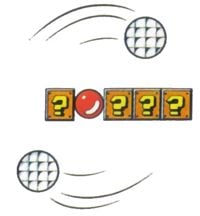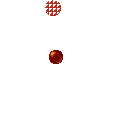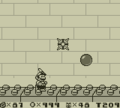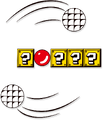Roto-Disc
| Roto-Disc | |||
|---|---|---|---|
 Artwork from Super Mario Bros. 3 | |||
| First appearance | Super Mario Bros. 3 (1988) | ||
| Latest appearance | Mario & Luigi: Superstar Saga + Bowser's Minions (2017) | ||
| |||
| |||
Roto-Discs[1][2][3][4] (also formatted as Rotodiscs,[5] Roto Discs,[6][7][8] and Roto-discs[9]), or simply Discs,[10] are Fire-Bar- and Spinner-like obstacles that first appear in Super Mario Bros. 3. Roto-Discs are found orbiting gray or red orbs, on which it is possible for Mario or Luigi to stand. Roto-Discs are nearly invulnerable; they can be destroyed if Statue Mario lands on top of one. Duo-Roto-Discs[11] can also be found, and they consist of two Roto-Discs circling the central orb. If the player destroys one, the other disappears.
Roto-Discs make their only other appearance in the Mini-Mario course of Bowser's Castle in Mario & Luigi: Superstar Saga and Mario & Luigi: Superstar Saga + Bowser's Minions. As a throwback to the previous games, they are obstacles that send Mario back to the beginning of the area if they connect with him.
Super Mario Land contains similar Roto Discs that similarly orbit a block and share the same attack pattern. Super Mario Land 2: 6 Golden Coins also contains an enemy known as a satellite in the Mario Zone, and it behaves in a similar fashion.
Profiles
Perfect Ban Mario Character Daijiten
Gallery
A Roto-Disc in Bowser's Castle in Mario & Luigi: Superstar Saga
Roto Disc, from Super Mario Land
Satellite, from Super Mario Land 2: 6 Golden Coins
Names in other languages
| Language | Name | Meaning | Notes |
|---|---|---|---|
| Japanese | クッキー[12] Kukkī |
Cookie | |
| French | Rotodisque[13] | Rotodisc | |
| Italian | Roto-Disc[?] | - | |
| Rotodisco[14] | Rotodisc | ||
| Roto-Disco[15] | Roto-Disc |
Trivia
- In Wario's Woods for the SNES, activating a combo causes an energy orb to appear and refill Birdo's time gauge. The sprite used for the orb is the same as the Roto-Discs, only with a different palette.[16]
- A sign reading "ROTO DISC" appears in the 1993 Super Mario Bros. film. According to production designer David L. Snyder, the Roto-Discs were imagined as the energy-conversion engines used in the electric Dinohattan cars.[citation needed]
References
- ^ June 1990. Nintendo Power Volume 13. Nintendo of America (American English). Page 9 and 80.
- ^ Peterson, Erik (2003). Super Mario Advance 4: Super Mario Bros. 3 Player's Guide. Nintendo of America (American English). ISBN 1930206-37-2. Page 15.
- ^ Hodgson, David S J. (October 21, 2003). Super Mario Advance 4: Super Mario Bros. 3 Prima's Official Strategy Guide. Prima Games (American English). ISBN 0-7615-4425-9. Page 20, 29, 30, 45, 49, 50, 60, 66, 67, 76, 77, 82, 85, 96, 97, 104, 105, and 106.
- ^ English Super Mario Bros. 3 entry on the official Mario portal. nintendo.co.jp (English). Retrieved August 13, 2022. (Archived August 13, 2022, 14:26:17 UTC via archive.today.)
- ^ Nintendo (1990). Super Mario Bros. 3 instruction booklet. Nintendo of America. Page 38.
- ^ June 1990. Nintendo Power Volume 13. Nintendo of America (American English). Page 46, 54, 55, 60, and 70.
- ^ 1993. Super Mario All-Stars Player's Guide. Nintendo of America (American English). Page 146.
- ^ Spring 1991. NES Game Atlas. Nintendo of America (American English). Page 42.
- ^ Nintendo (2010). Super Mario All-Stars Limited Edition instruction booklet. Nintendo of America (American English). Page 27.
- ^ Hodgson, David S J. (October 21, 2003). Super Mario Advance 4: Super Mario Bros. 3 Prima's Official Strategy Guide. Prima Games (American English). ISBN 0-7615-4425-9. Page 85.
- ^ June 1990. Nintendo Power Volume 13. Nintendo of America (American English). Page 59.
- ^ Nintendo (1990). スーパーマリオブラザーズ3 (Sūpā Mario Burazāzu Surī) instruction booklet. Nintendo (Japanese). Page 39.
- ^ Super Mario Bros. 3 French instruction booklet. Page 44.
- ^ Nintendo (2010). Super Mario All-Stars Limited Edition Italian manual. Nintendo of Europe (Italian). Page 28.
- ^ Sakai, Kazuya (Ambit) et al. (October 19, 2015). Super Mario Bros. Hyakka: Nintendo Kōshiki Guidebook, Super Mario Bros. 3 section. Shogakukan (Japanese). ISBN 978-4-09-106569-8. Page 36.
- ^ MarioBrothBlog (August 26, 2020). After activating a combo in the SNES version of Wario's Woods, an energy orb appears and refills Birdo's time gauge. The sprite used for the orb is exactly the same as the Roto-disc enemy from Super Mario Bros. 3, only with a different palette. This connection is never explained.. X. Retrieved May 22, 2024.





